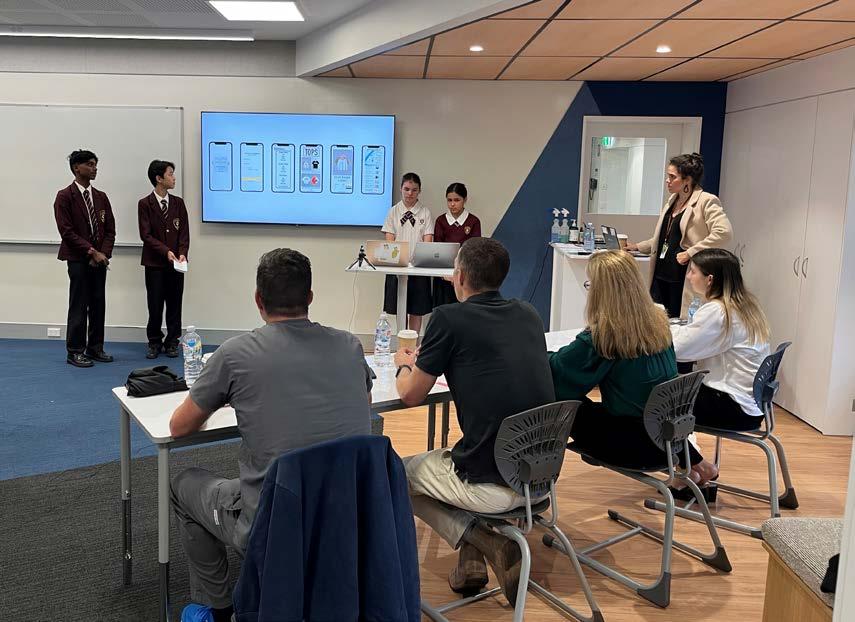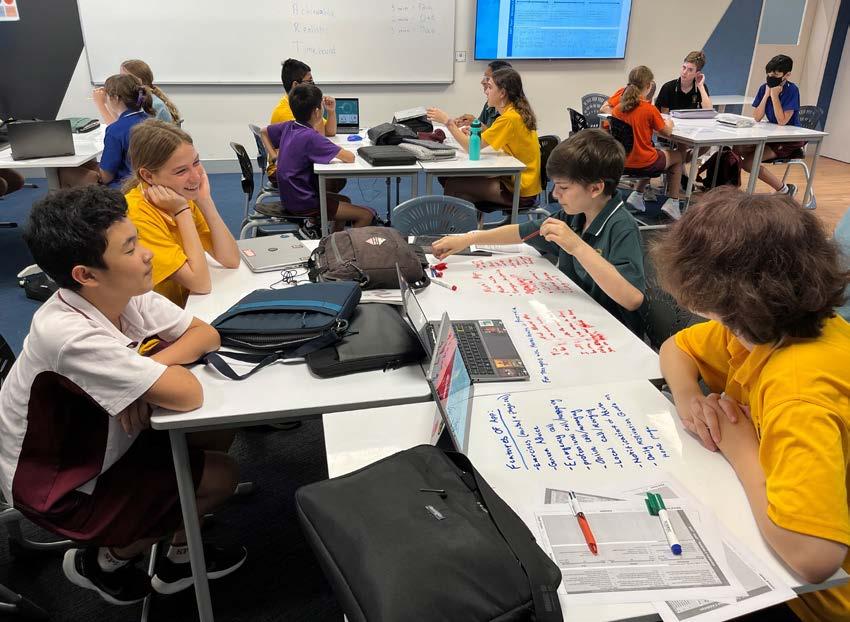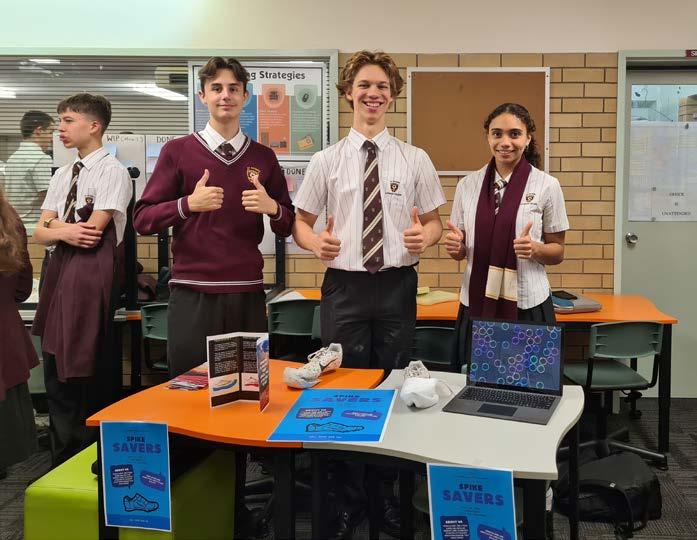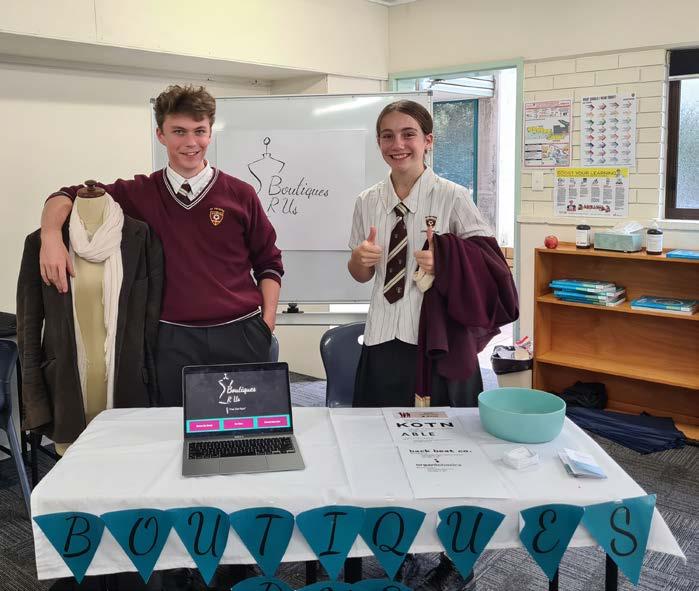
6 minute read
Creating entrepreneurs
OLIVIA LARNEY Acting Head of 7-12 Curriculum - Students In 2016, Year 12 student, Daniel Dunn, brought up the idea of an ‘Entrepreneurial Boardroom’—a lunchtime club where likeminded individuals could meet and share their knowledge about starting and running businesses. Dan was already an entrepreneur. He had run many businesses; some that had made money; some that hadn’t. The products he had sold were far-ranging and so were his methods; import, online, electronics to name a few. His skill was in seeking an opportunity where there was one, carefully watching the world around him and using what he knew (and learning more if necessary) to meet its needs. This, however, wasn’t all about personal profit. It was more about seeing if it could be done. Now Dan saw an opportunity to share what he knew with those younger than himself, and to create entrepreneurs instead of products. So, The Boardroom was born. Meeting once a week on a Wednesday lunchtime, Dan would share his knowledge, from coming up with an idea, how to import products, the best online marketplaces, and the list went on. Not only was it evident how much Dan had learnt in his young life, but also how many others were interested. Students from diverse year levels, academic skill-levels and interest areas would come to hear his advice. They trusted him because he had lived it. The club became a buzz of budding business owners of the future. Then Dan graduated … leaving behind a gaggle of completely enamoured followers who wanted to know and do more. Although I had also dabbled in a hobby business, my entrepreneurial knowledge was not of the same calibre, so we started to look externally for opportunities such as guest speakers and excursions to whet their appetites. We visited the IdeaHub at UQ, took part in competitions like Generation Innovate Challenge and the Plan your own Business Competition, and had guest speakers share their passion and interests. But there was something missing. The knowledge transmission between mentor and mentees was dwindling and now The Boardroom was feeling like ‘watching entrepreneurs’, not growing entrepreneurs. I knew we needed to embed what we were doing into the curriculum; show students and teachers that we could teach students to be entrepreneurial, just as Dan had done. Entrepreneurship has never been as important as it is today when the world is confronted with big challenges that extend well beyond the global community (World Economic Forum, 2012, Education weforum.org/issues/ education). I knew that this knowledge and these skills were both desired by the students and needed by the world around them. And so, in 2018, the creation phase began. Isolated comments in Australian Curriculum, Assessment and Reporting Authority (ACARA) documents showed that Australian curriculum writers felt entrepreneurship both could be and should be taught. However, these ‘mentions’ in curriculum were brief and centred on looking at others being entrepreneurial, rather than acting on what a student learnt. It was evident from my time in the The Boardroom that this would not fit the market; our students wanted to be entrepreneurs, not just read about them. Textbooks were also lacking, with dull, minimalist, outward-looking activities that were not going to create the type of student response we were looking for. Instead, I went to where entrepreneurs learn these skills: popular non-fiction. It was here that the Entrepreneurial Studies unit planning started. Books such as Lean Start-Up, Grit, Blue Ocean Strategy, and Insight Out started to form the backbone of a semester-long course teaching creativity, the innovation cycle, lean start-up strategy, design thinking, and so much more. With much apprehension, the Entrepreneurial Studies course was proposed at the end of 2019 and became an elective available to Year 10 students in 2020. When 2020 rolled around, no-one could have predicted the difficulties we would face in running this hands-on course. With the first cohort of entrepreneurs stuck in lockdown during the prototyping phase, which was intended to be in groups, we went back to basics, and applied the lean start-up model. Students developed their prototypes on their own from anything around their home; including




Pictured (clockwise from top left): Year 7 'Ethicool' students pitching to their own 'shark tank'; Year 10 Entrepreneurial Studies teams with their unique ideas - Happy Feet, Spike Savers and Boutiques R Us; Year 7 students receiving validation for their business ideas.
cardboard, recycled materials, or competitors’ products with ‘incremental’ improvements. The bravery and ingenuity of the students in such an uncertain time was heart-warming to see. We were very proud of these first entrepreneurs. Only in the second semester of 2020 were we able to run the course as it was intended. We were able to select the ‘best’ ideas to take to the group phase in Term 4, with a hiring process for students to join teams around the founding entrepreneurs. But after a few bumps in the road, such as our first ‘shark tank’ style event being somewhat underwhelming, we went back to the drawing board, yet again. Our second prototype needed some remodelling. We decided that the groups needed to seek advice and improve their products’ ability to meet market needs before the final pitch event. Market validation days now occur in the middle of Terms 2 and 4, after teams have created prototypes, logos and marketing materials, and market validation surveys. These artefacts of their ideas are shared with our community in a lunchtime ‘market’, with students and teachers turning up in droves to see the latest ideas coming from our community (pictured above centre and right). Students are so proud to share what they have been working on and receive valuable feedback that assists in further development of their ideas before final pitch. Developments continued. Year 7 Digital Technology’s 'Ethicool' project was already embedding similar design thinking and entrepreneurship models in their project work, and students were pitching their ideas for apps they had created. Our Year 10 students now take what they know and mentor these Year 7s through their ideation and validation stages, and assist them with pitching. We have seen this mentorship return great benefits. The Year 7s have begun to see the application of what they are learning to their future studies. The Year 10s put into practice what they have learnt, realising they now have skills for real life. We have been overwhelmed by the support of many Old Scholars and entrepreneurial groups in the beginning years of our Entrepreneurial Studies course. Big thanks go to Dan Dunn, Mikhara Ramsing, Lara Berge, Ashley Baxter, and so many more, as well as to UQ’s IdeaHub and ilab Accelerator for providing mentors and judges. With the opening of the Centre for Learning and Innovation just around the corner, we hope Entrepreneurial Studies will continue to develop in the maker spaces, flexible learning areas, and Entrepreneurial Boardroom housed in this new building. Entrepreneurial Studies is always looking for new ideas, and we encourage any members of our community who have experience, interest or passion for entrepreneurship to make themselves known to the Business Studies department by contacting Olivia Larney (o.larney@stpeters.qld.edu.au) or Alex Lawn (a.lawn@stpeters.qld.edu.au). We look forward to hearing from you.









